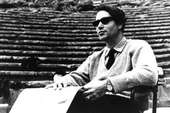On January 8th 1970, in a car accident a few kilometers outside Athens, the contemporary music world lost one of its most exciting and provocative talents. Although Jani Christou was only 44 when he died, he was regarded by many as one of the leading composers of his generation. He was controversial, highly talented, and greatly admired both in his own country and abroad. And yet although his name remains respected in contemporary music circles to this day, performances of his music are extremely rare. At the time of Christou's death, his music was being heard at some of the most prestigious international music festivals in the world, and he was also preparing to unveil the most ambitious project of his career -a large scale contemporary opera based on Aeschylus's Oresteia (1967-70). However, Christou's untimely death left many projects incomplete including the Oresteia which would have received its world premiere at the English Bach Festival in London in April 1970, with further performances scheduled for France, Japan, America and Scandinavia.
Jani Christou was born at Heliopolis, N.E. of Cairo, on January 8th, 1926, of Greek parents. He was educated at the English Sxhool in Alexandria, and began composing at an early age. In 1945 he travelled to England to study formal logic and philosophy at King's College, Cambridge under Ludwig Wittgenstein and Bertrand Russell (he attained an MA in philosophy in 1948). At the same time he studied music privately with Hans Ferdinand Redlich, the distinguished musicologist and pupil of Alban Berg, and in 1949 travelled to Rome to study orchestration with Francesco Lavagnino. He also travelled widely in Europe, culminating for a short period in Zurich, where he met and attended lectures in psychology with Carl Jung. Christou's studie in psychology were greatly encouraged by his brother Evanghelos (himself a pupil of Jung) whom Christou considered his spiritual mentor and who exerted a strong influence on his creative thinking. Christou was deeply affected by his brother's death in 1956 as the resul of a car accident.He returned to Alexandria in 1951, and in 1956 he married Theresia Choreme a remarkable young painter from Chios who supported and assisted Christou in all his artistic and creative aspirations. Christou would work long hours at a stretch, but when not actually physically engaged in the act of composing would spend a great deal of time studying in his vast library of books and absorbing subjects from philosophy, anthropology, psychology, theology and comparative religions, history and pre-history through to occultism and art. Christou was as much a philosopher and metaphysician as he was a composer, and it is important to understand that all of his music sprang from his philosophical studies and theories. This is particularly so in the music covering the last ten years of his life, where his compositional techniques are at times transmuted beyond conventional music.By that time, in Alexandria, he organized his private recording studio and devoted to composition. By 1953, he had already composed his first extended symphonic works: Phoenix Music, Symphony No 1, Latin Mass. By 1956 he had completed the Six T.S. Eliot Songs. In 1960 Christou settled permanently in Greece dividing his time between Chios and Athens. He had already completed the works Symphony No 2 and Patterns and Permutations. He composed music for ancient drama for the Greek State Theatre and the Art Theatre of Karolos Koun. The works Toccata for pianoforte and orchestra, the oratorios Tongues of Fire and Mysterion followed. He moved to Athens due to the increasing artistic events to which he had to participate. His later period of composition followed: Praxis for 12, The Strychnine Lady, Epicycle, Enandiodromia, Anaparastasis" -an ensemble of various multi-artistic rituals, only two of which are completed: Anaparastasis I or The Baritone and Anaparastasis III or The Pianist. From 1967 he had been hectically working on an ambitious plan. A contemporary opera based on the Oresteia by Aeschylus, which he never introduced. At the dawn of January 8th 1970, while returning from a tavern where he had taken his friends to celebrate his name day, Jani Christou was killed in a car accident. The next day was his birthday. He was only 44 years old and one of the leading composers of his generation.